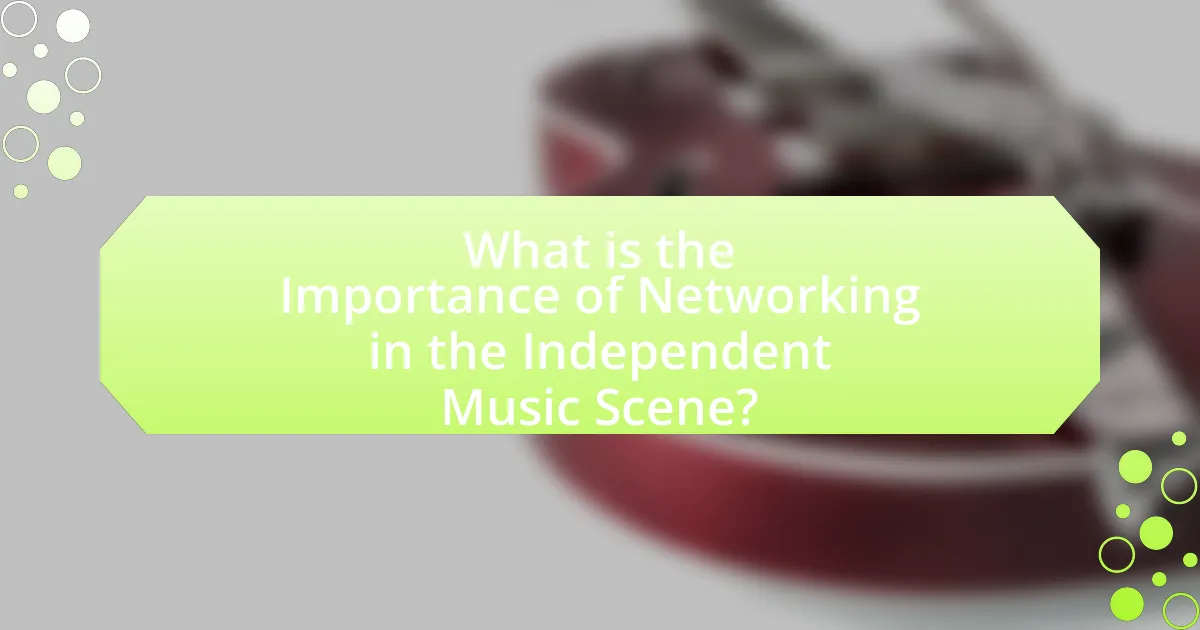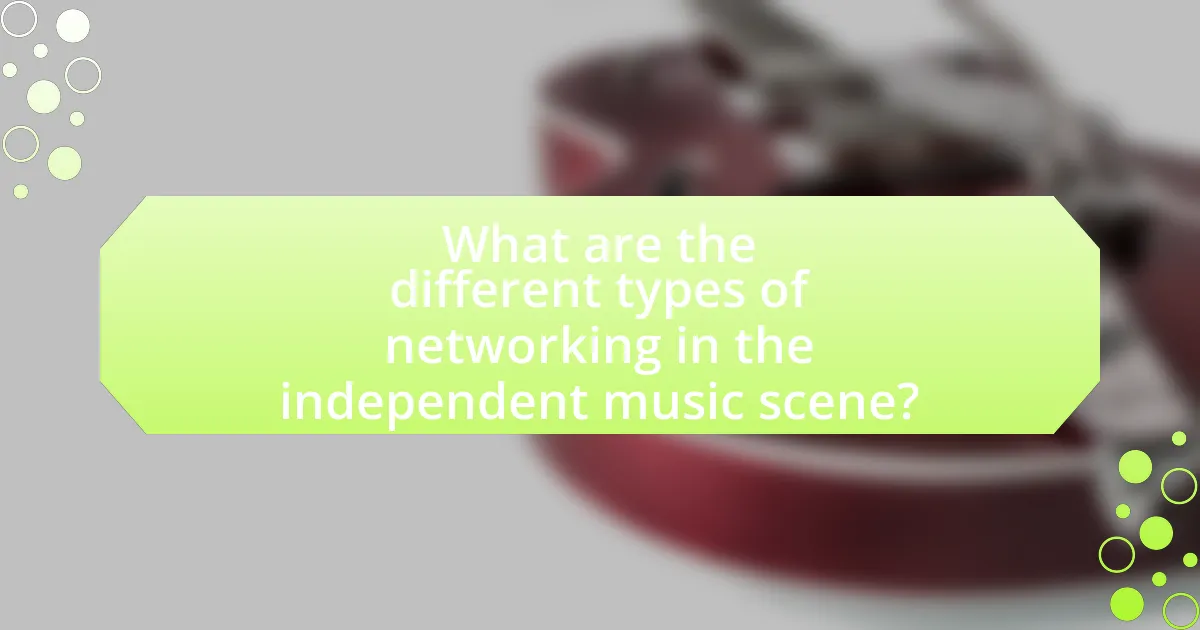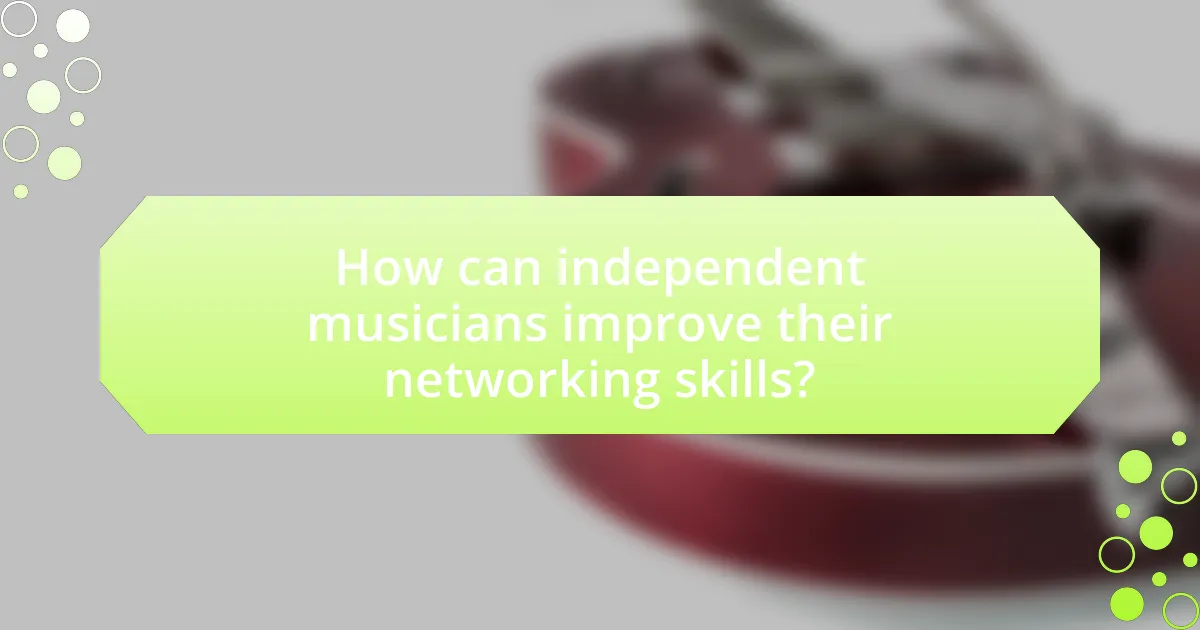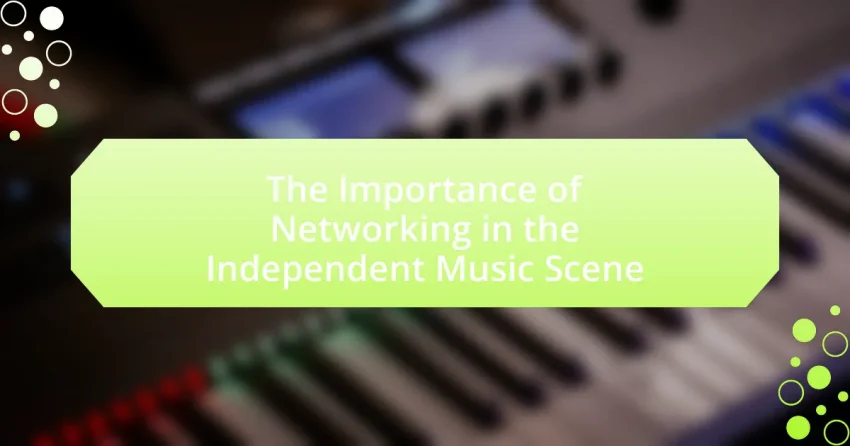The article focuses on the importance of networking in the independent music scene, emphasizing its role in facilitating connections that lead to collaboration, exposure, and career opportunities for artists. It highlights key elements of effective networking, such as building genuine relationships, leveraging social media, and attending industry events. The article also contrasts networking in the independent music scene with mainstream music, detailing how grassroots connections are vital for independent artists. Additionally, it discusses the benefits of networking, including increased visibility, access to resources, and the potential for collaborations that enhance creativity and career growth.

What is the Importance of Networking in the Independent Music Scene?
Networking is crucial in the independent music scene as it facilitates connections that can lead to collaboration, exposure, and opportunities for artists. By building relationships with other musicians, producers, and industry professionals, independent artists can share resources, gain insights, and access platforms that enhance their visibility. For instance, a study by the Berklee College of Music found that 70% of musicians attribute their career advancements to networking efforts, highlighting its significance in securing gigs, partnerships, and promotional opportunities.
How does networking influence success in the independent music industry?
Networking significantly influences success in the independent music industry by facilitating connections that lead to opportunities for collaboration, promotion, and exposure. Independent artists often rely on relationships with other musicians, producers, and industry professionals to gain access to resources that can enhance their visibility and credibility. For instance, a study by the Berklee College of Music found that 70% of musicians attribute their career advancements to networking, highlighting its critical role in securing gigs, media coverage, and partnerships. Additionally, platforms like social media enable artists to build their networks, allowing them to reach wider audiences and engage with fans directly, which is essential for independent success.
What are the key elements of effective networking for independent musicians?
The key elements of effective networking for independent musicians include building genuine relationships, leveraging social media, attending industry events, and collaborating with other artists. Building genuine relationships fosters trust and opens doors to opportunities, as musicians who connect authentically are more likely to support each other. Leveraging social media platforms allows musicians to reach wider audiences and engage with fans and industry professionals, enhancing visibility. Attending industry events, such as music festivals and conferences, provides direct access to potential collaborators and industry insiders, facilitating valuable connections. Collaborating with other artists not only expands a musician’s network but also enhances creativity and exposure through shared audiences. These elements collectively contribute to a musician’s success in the competitive landscape of the independent music scene.
How does networking differ in the independent music scene compared to mainstream music?
Networking in the independent music scene is characterized by more personal, grassroots connections, while mainstream music relies on established industry relationships and corporate structures. Independent artists often build their networks through local shows, social media interactions, and community engagement, fostering direct relationships with fans and other musicians. In contrast, mainstream artists typically engage with industry professionals, such as managers and label executives, who facilitate connections through formal channels. This difference is evident in the way independent musicians leverage platforms like Bandcamp and SoundCloud to reach audiences directly, whereas mainstream artists often depend on radio play and major label promotions to gain visibility.
Why is networking essential for independent artists?
Networking is essential for independent artists because it facilitates opportunities for collaboration, exposure, and access to resources that can enhance their careers. By connecting with other musicians, industry professionals, and potential fans, independent artists can share their work, gain valuable feedback, and build a supportive community. Research indicates that 85% of jobs are filled through networking, highlighting its critical role in career advancement. Additionally, networking can lead to performance opportunities, partnerships, and increased visibility in a competitive market, ultimately contributing to an artist’s success and sustainability in the independent music scene.
What opportunities can arise from strong networking connections?
Strong networking connections can lead to various opportunities such as collaborations, increased visibility, and access to resources within the independent music scene. Collaborations with other artists can enhance creativity and expand audiences, as evidenced by numerous successful partnerships in the industry that have resulted in chart-topping hits. Increased visibility often comes from being introduced to new audiences through mutual connections, which can significantly boost an artist’s profile. Additionally, networking can provide access to essential resources like funding, venues, and promotional platforms, as many independent musicians have reported securing gigs and financial support through their networks. These opportunities collectively contribute to career growth and sustainability in the competitive landscape of independent music.
How does networking contribute to an artist’s visibility and reach?
Networking significantly enhances an artist’s visibility and reach by facilitating connections with industry professionals, fans, and other artists. These connections can lead to collaborative opportunities, increased exposure through shared platforms, and access to resources such as venues and promotional channels. For instance, a study by the Berklee College of Music found that 70% of musicians attribute their success to networking, highlighting its critical role in gaining visibility. Additionally, artists who actively engage in networking often benefit from word-of-mouth promotion, which can exponentially increase their audience reach.

What are the different types of networking in the independent music scene?
The different types of networking in the independent music scene include artist collaborations, social media engagement, live performances, and participation in music festivals. Artist collaborations allow musicians to combine their fan bases and resources, enhancing visibility and reach. Social media engagement facilitates direct communication with fans and industry professionals, fostering relationships that can lead to opportunities. Live performances create networking opportunities through interactions with other artists, promoters, and audiences, which can result in future gigs or collaborations. Participation in music festivals provides a platform for exposure and networking with industry insiders, helping independent artists to establish connections that can advance their careers.
How can musicians network with industry professionals?
Musicians can network with industry professionals by attending music industry events, utilizing social media platforms, and collaborating with other artists. Engaging in events such as music festivals, conferences, and workshops allows musicians to meet industry insiders face-to-face, fostering personal connections. Social media platforms like LinkedIn, Instagram, and Twitter enable musicians to showcase their work and interact with industry professionals, expanding their reach and visibility. Collaborating with other artists not only enhances creativity but also opens doors to their networks, increasing opportunities for exposure and professional relationships. These methods are effective as they create direct pathways for communication and collaboration within the music industry.
What roles do managers, agents, and promoters play in networking?
Managers, agents, and promoters play crucial roles in networking within the independent music scene by facilitating connections and opportunities for artists. Managers oversee an artist’s career, helping to build relationships with industry professionals, while agents focus on securing performance opportunities and negotiating contracts. Promoters are responsible for organizing events and marketing shows, creating platforms for artists to showcase their work. Together, these roles enhance visibility and access to resources, which are essential for success in the competitive music industry. For instance, a study by the Music Industry Research Association highlights that effective networking can lead to increased bookings and collaborations, demonstrating the tangible benefits of these roles in fostering artist growth.
How can musicians effectively connect with venue owners and booking agents?
Musicians can effectively connect with venue owners and booking agents by leveraging social media platforms, attending industry events, and building personal relationships. Social media allows musicians to showcase their work, engage with venue owners, and share performance opportunities, making it easier to establish connections. Industry events, such as music festivals and conferences, provide networking opportunities where musicians can meet venue owners and booking agents face-to-face, facilitating direct communication. Additionally, building personal relationships through consistent follow-ups and expressing genuine interest in the venue’s programming can lead to more opportunities for collaboration. These methods are supported by the fact that 70% of music industry professionals prioritize personal relationships when considering artists for bookings, highlighting the importance of networking in the independent music scene.
What are the benefits of networking with other musicians?
Networking with other musicians provides numerous benefits, including collaboration opportunities, exposure to new audiences, and access to industry resources. Collaborating with fellow musicians can lead to innovative projects and creative growth, as diverse perspectives enhance artistic expression. Additionally, networking expands an artist’s reach, allowing them to tap into each other’s fan bases, which can significantly increase visibility and potential sales. Access to industry resources, such as knowledge about gigs, recording opportunities, and promotional strategies, is also a crucial advantage of networking. Studies show that musicians who actively network are more likely to secure performance opportunities and gain recognition in the competitive music landscape.
How can collaboration enhance networking opportunities?
Collaboration enhances networking opportunities by creating connections between individuals and groups with shared interests and goals. When artists collaborate on projects, they not only combine their talents but also expand their reach to each other’s audiences, thereby increasing visibility and potential partnerships. For instance, a study by the Berklee College of Music found that musicians who collaborate are more likely to gain followers and opportunities, as they tap into each other’s networks. This interconnectedness fosters a community where resources, knowledge, and support are shared, ultimately leading to more significant professional relationships and opportunities within the independent music scene.
What are the advantages of joining music collectives or communities?
Joining music collectives or communities provides significant advantages, including enhanced networking opportunities, access to resources, and collaborative support. These collectives foster connections among musicians, enabling them to share knowledge, collaborate on projects, and gain exposure to wider audiences. Research indicates that musicians who engage in community networks often experience increased opportunities for performances and collaborations, as highlighted in a study by the University of Southern California, which found that 70% of independent artists reported that networking within collectives led to more gigs and partnerships. Additionally, collectives often provide access to shared resources such as rehearsal spaces, promotional tools, and industry contacts, which can be crucial for independent artists navigating the competitive music landscape.

How can independent musicians improve their networking skills?
Independent musicians can improve their networking skills by actively participating in local music events and online communities. Engaging in these environments allows musicians to meet industry professionals, collaborate with peers, and gain exposure. For instance, attending open mic nights or music festivals provides opportunities to connect with other artists and potential fans, while platforms like social media and music forums enable musicians to share their work and interact with a broader audience. Research indicates that 85% of job positions are filled through networking, highlighting the importance of building relationships in the music industry.
What strategies can musicians use to build a strong network?
Musicians can build a strong network by actively engaging in collaborations, attending industry events, and utilizing social media platforms. Collaborations with other artists not only enhance creativity but also expand reach, as seen in the success of artists like Ed Sheeran, who frequently collaborates with various musicians to tap into their fan bases. Attending industry events such as music festivals, conferences, and workshops allows musicians to meet industry professionals and fellow artists, fostering relationships that can lead to future opportunities. Additionally, leveraging social media platforms like Instagram and Twitter enables musicians to connect with fans and industry influencers, as evidenced by the rise of artists who gained popularity through viral social media campaigns. These strategies collectively enhance visibility and create valuable connections within the music industry.
How can social media be leveraged for effective networking?
Social media can be leveraged for effective networking by facilitating direct connections between independent musicians and their target audiences, industry professionals, and collaborators. Platforms like Instagram, Twitter, and Facebook allow artists to showcase their work, engage with fans, and participate in conversations relevant to their genre. For instance, a study by the Pew Research Center indicates that 72% of adults use social media, making it a vital tool for reaching a broad audience. Additionally, using hashtags and joining music-related groups can enhance visibility and foster relationships with other artists and industry stakeholders. This strategic use of social media not only increases exposure but also builds a supportive community, essential for success in the independent music scene.
What are the best practices for attending music events and festivals?
The best practices for attending music events and festivals include planning ahead, staying hydrated, and networking effectively. Attendees should research the event schedule and lineup in advance to prioritize performances and activities of interest. Staying hydrated is crucial, especially in outdoor settings, as dehydration can lead to fatigue and decreased enjoyment. Networking is essential in the independent music scene; attendees should engage with artists, industry professionals, and fellow fans to build connections that can lead to future opportunities. According to a study by the National Endowment for the Arts, networking at events can significantly enhance career prospects for musicians and industry professionals.
What common mistakes should musicians avoid in networking?
Musicians should avoid being overly self-promotional in networking situations. This mistake can alienate potential collaborators and industry contacts, as it often comes across as insincere or desperate. Instead, musicians should focus on building genuine relationships by actively listening and engaging with others. Research indicates that networking is most effective when individuals prioritize mutual benefit over self-interest, fostering a collaborative environment that can lead to fruitful partnerships.
How can poor networking practices hinder an artist’s career?
Poor networking practices can significantly hinder an artist’s career by limiting their access to opportunities and collaborations. Artists who fail to build and maintain relationships within the music industry miss out on crucial connections that can lead to gigs, promotions, and partnerships. For instance, a study by the Berklee College of Music found that 70% of music industry professionals rely on personal connections to discover new talent. Without effective networking, artists may struggle to gain visibility, receive support from industry insiders, or find mentors who can guide their development. This lack of engagement can result in stagnation in their career growth and reduced chances of success in a competitive market.
What are the signs of ineffective networking efforts?
Ineffective networking efforts are indicated by a lack of meaningful connections and engagement within the independent music scene. Signs include minimal follow-up communication after initial meetings, absence of collaborative opportunities, and failure to receive referrals or introductions from contacts. Additionally, if networking activities do not lead to increased visibility or support for projects, it suggests that the efforts are not yielding results. Research shows that effective networking should result in reciprocal relationships, and the absence of such relationships is a clear sign of ineffectiveness.
What practical tips can help musicians maximize their networking efforts?
Musicians can maximize their networking efforts by actively participating in local music events and online communities. Engaging in these environments allows musicians to meet industry professionals, collaborate with peers, and gain exposure. For instance, attending open mic nights or music festivals provides opportunities to connect with other artists and potential fans. Additionally, utilizing social media platforms like Instagram and Twitter to share music and interact with followers can enhance visibility and foster relationships. Research indicates that 85% of jobs are filled through networking, highlighting its significance in the music industry. By consistently networking, musicians can build valuable connections that may lead to future opportunities.
How can musicians create a memorable personal brand for networking?
Musicians can create a memorable personal brand for networking by defining a unique artistic identity that resonates with their target audience. This involves developing a consistent visual style, sound, and message across all platforms, including social media, music releases, and live performances. For instance, artists like Billie Eilish have successfully established a distinct brand through their unique aesthetics and relatable themes, which has contributed to their widespread recognition and networking opportunities. Additionally, engaging storytelling about their journey and values can enhance relatability and connection with fans and industry professionals. This approach not only fosters a loyal fanbase but also attracts collaborations and networking opportunities within the music industry.
What follow-up strategies are effective after initial networking interactions?
Effective follow-up strategies after initial networking interactions include sending personalized thank-you emails, connecting on social media platforms, and scheduling follow-up meetings. Personalized thank-you emails reinforce the connection and express gratitude, which can lead to stronger relationships; studies show that personalized communication increases response rates by 26%. Connecting on social media allows for ongoing engagement and visibility, keeping the relationship active. Scheduling follow-up meetings provides an opportunity to discuss potential collaborations or projects in more detail, enhancing the likelihood of future partnerships. These strategies are supported by research indicating that consistent follow-up can significantly improve networking outcomes in professional settings.
